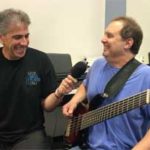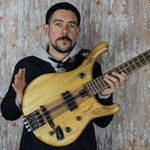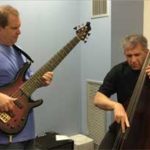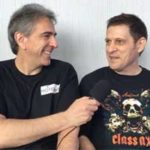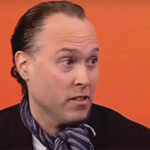Heralded U.K. session player and passionate educator provides teaching tips and info on publications
Exclusive interview with FBPO’s Jon Liebman
November 12, 2012
Joe Hubbard is an internationally acclaimed bass guitarist, teacher/clinician and contemporary jazz-fusion recording artist. Throughout a career that began over three decades ago, Joe has performed with a wide range of musical acts, including George Benson, Denny Laine, John Tesh, Alvin Lee, Everything But the Girl, Russ Freeman, David Garibaldi, Dave Weckl, Niels Lan Doky, Michael Paulo, Frank Gambale and many others. He has also released three solo CDs as a leader and is a published composer and writer.
FBPO: How would you describe your musical upbringing?
JH: I really started to play when I first went to the Berklee College of Music in 1975. Although I owned a bass in high school, I didn’t know anything about music other than a major scale and a few Santana bass lines. My father was an Army officer and was bent on me going to college. When he asked me where I had decided to go, I responded with, “How about the Berklee College of Music in Boston?” I only said that because a friend of mine was going, so it was kind of an accident that I ended up there.
FBPO: How did you become a bass player?
JH: As an Army brat, I spent some time growing up in Bangkok, Thailand. At the time I was playing guitar. I went to a cool rock concert at my school that featured a local guitarist called Arjuna Cole and noticed how cool the bass player looked and decided that was the instrument I wanted to play. It took me a few more years to actually get one, but the first bass I had was a pre-CBS Fender Precision that was later stolen from me at gun point when I was at Berklee.
FBPO: When did your career really start to take off? Was there a defining moment when you realized you were actually going to become a professional musician?
JH: After two years of Berklee, I decided to leave and try to get some experience as a player. I moved to L.A. and stayed there for about eight months. I wasn’t getting anywhere and decided to move to Honolulu, Hawaii, where my brother lived. A friend of my brother’s pointed me in the direction to audition for a Hula Show and I got the gig. It was six nights a week and paid me enough to eat and pay rent.
Hawaii had a great music scene and I would hit all the clubs after my show to sit in. This was where I was able to network with people and get my name around. Ben Rietveld, bass player with Miles Davis and Santana, was a local player on the Hawaiian scene and heard me play. He was playing with a big pop star in Honolulu called Nohelani Cypriano and could no longer do the gig because of his school commitments, so I auditioned and got that gig. Our first gig was at Aloha Stadium, supporting Cecilio & Kapono. I remember that I was the first one the stage and, when I plugged in to my amp, I hit a big low E and the crowd went wild. That was it for me. I knew at that moment that I was going to be a musician forever.
FBPO: In addition to all the recording and performing you’ve done, you also seem to have a real passion for education. What have you done in that regard?
JH: Well, I moved to the U.K. in 1981. I needed some money, so I started to teach to supplement my income. When I was in Hawaii I studied with a great bass player called Jeff Castleman, who was the last guy to play with Duke Ellington’s band before Duke died. Jeff didn’t really have an organized system, but the stuff he taught me about the instrument I had later organized into a deep system that I still teach today. When I started teaching, I taught an amalgamation of what I had learned from Jeff, the harmony and theory that I learned at Berklee and a bunch of slapping stuff that was popular at the time because everybody wanted to learn to play like Mark King from Level 42.
The whole teaching thing just kind of grew alongside of my playing career. I started to do a bunch of clinics for different music manufacturers and then became the house bass teacher at the infamous Bass Centre in London. Eventually, I became so in-demand as a bass teacher that I just went it alone.
I ended up teaching every major bass player in the U.K. scene over the span of two decades. I also ended up teaching in Los Angles at the Musician’s Institute as a visiting instructor. One of my greatest moments was when I taught at the Bass Centre in North Hollywood, alongside bass greats Jeff Berlin, Gary Willis and Baba Elefante. At that time, Jeff Berlin was just starting the Player’s School of Music and offered me a gig, but there was too much going on in L.A. at that time for me to want to uproot and move to Florida.
It has to be said that my success as a teacher is a result of being a perpetual student. Aside from my studies at Berklee, where I studied with Bruce Gertz, Rich Appleman, John Neves and Jeff Berlin, I studied with jazz improvisation guru Charlie Banacos for ten years and still continue that to this day with his top student Garry Dial. In 1986 I also studied composition with Dick Grove for a year.
FBPO: I understand Pino Palladino was one of your students. What kind of a student was he?
JH: Ironically, Pino was my very first student. On his first lesson, he played me a solo he had transcribed by ear from Anthony Jackson off a Harvey Mason record. He could definitely already play, but he didn’t understand any theory or harmony, so that’s what we worked on. Pino was always incredibly diligent and just learned what I gave him and got on with it. He studied with me off and on for about a year. After that, he was too busy, but we always remained good friends.
FBPO: Do you have any special “Hubbard-isms” you try to instill in your students regarding skill, technique, career, etc.?
JH: My main message is all about learning the bass guitar by understanding the five components of music: melody, rhythm, harmony, counterpoint and form. I never tell any of my students what style of music to play; I just give them the nuts and bolts and inspire them – not confine them – to play the music they want to play. I’m really a musical concepts guy, rather than teaching a bunch of licks. I often describe it to people as, “Rather than giving you a fish to eat every day, I’d like to teach you how to fish.”
FBPO: Tell me about your bass-related publications. I’ve had your Basslines book for years!
JH: I’m in the process for releasing a new book called The Sight Reading Compendium for Electric Bass. This will be a unique book, as most people still believe that to become a good sight reader you just have to read a lot. This book is based on a holistic approach that works interdependently with your level of playing. Earlier this year, I released a book called Walking Bass Lines. Both of these books are different to the majority of bass books on the market because they are conceptually-based, rather than a series of compartmentalized ideas.
I wrote Basslines in 1983. I had just finished touring with Gary Numan and needed some money. Being very young and inexperienced, I accepted a very bad deal. That book went on to sell well over a 100,000 copies. It was one of the first bass transcription books of its kind.
FBPO: What’s keeping you busy these days?
JH: I am a Senior Lecturer at The Academy of Contemporary Music, where I have pretty much re-written the entire bass curriculum in the last year. I also run a website, where you can purchase my books and inquire about my private teaching schedule. Outside of my commitments at ACM, I have room for about fifteen students a week. I do this through Skype and in-person appointments. I also teach a bass email course, which has really taken off.
Aside from all of that, I am currently working on a bass membership site, which will enable people who do not want to commit to regular lessons to learn through my video library. We live in the YouTube era, where any Jake leg with a camera can upload a video and claim they are a teacher. The flipside of this is where you have some very talented bass players doing the same thing, but aren’t presenting anything in a logical progression. My video membership site will be laid out where you can get quality bass lessons that are built in a progression, from A to Z.
FBPO: How about the future? What else would you like to do that you haven’t already accomplished?
JH: When and if I come up for any air, I want to start working on some new recording projects. I am relatively new to a lot of the computer technology, but I am slowly working my way through Pro Tools. I am quite a prolific composer and really see myself writing for film and TV in the future.
FBPO: What would you be if you weren’t a bass player?
JH: Well, I already know the answer to that, as I gave up playing bass from 2005 to 2010. I am an accomplished martial artist, with black belts in Filipino Arnis and Karate; a world recognized instructor in close quarter combat and police defensive tactics and a licensed close protection operative. I have taught both police and military and worked throughout the U.K., Europe and Africa. I have also starred in five instructional martial arts DVDs.
Also see our exclusive FBPO interviews with the
following bass players, all of whom are mentioned here:
[table id=41 /]

